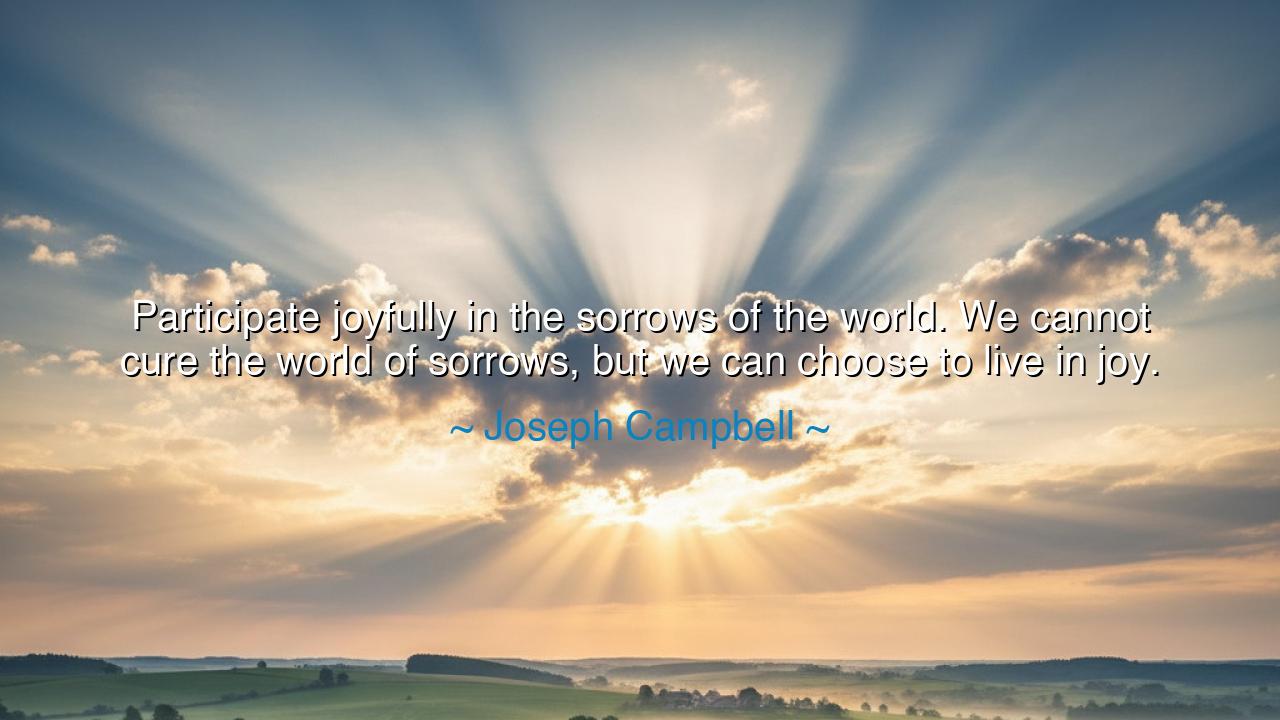
Participate joyfully in the sorrows of the world. We cannot cure
Participate joyfully in the sorrows of the world. We cannot cure the world of sorrows, but we can choose to live in joy.






The words of Joseph Campbell, “Participate joyfully in the sorrows of the world. We cannot cure the world of sorrows, but we can choose to live in joy,” ring with the wisdom of the ages. They are the speech of a philosopher who gazed deeply into the human condition and saw that life’s beauty and pain are woven from the same fabric. Campbell, a scholar of myth and spirit, understood what the ancients also knew: that sorrow is not an aberration, but a constant companion of existence — and that our noblest task is not to escape it, but to dance with it.
In these words lies the paradox of life itself. The world is filled with both splendor and suffering. We are born into a realm where love ends in loss, where joy blooms beside decay. Yet Campbell calls us not to despair, but to participate joyfully — to enter the stream of life with an open heart, to embrace the full measure of being alive. The wise do not wait for sorrow to vanish before they live; they live through it, turning pain into understanding and tears into song. This, he teaches, is the highest art of the soul.
The ancients spoke of this same truth through their myths and heroes. The Greek tragedians knew that even the gods could not banish sorrow from the human story. In the tale of Orpheus and Eurydice, love itself descends into darkness, and yet from that sorrow comes music that touches eternity. The Buddha, too, upon seeing the suffering of the world, did not flee — he sat beneath the Bodhi tree and awakened, not to escape sorrow, but to understand and transcend it. In each of these stories, we find the same lesson that Campbell gives: joy does not mean the absence of grief, but the awakening of the spirit that says, “Even in pain, I will love life.”
Campbell’s words come from a deep awareness of the world’s brokenness — wars, losses, injustices — and yet they offer hope that rises above despair. He does not promise comfort through ignorance, but freedom through awareness. To participate joyfully in the sorrows of the world means to accept the imperfection of life without letting it harden the heart. It is to choose compassion over bitterness, creation over complaint. The wise know that sorrow shared becomes softer, and that joy, born from empathy, shines brighter than pleasure born of denial.
Consider the life of Nelson Mandela, who endured decades of imprisonment, stripped of freedom, separated from his family and his nation. Yet when he emerged, he did not bring vengeance — he brought forgiveness. He chose to live in joy, though sorrow had marked every year of his captivity. Mandela’s strength was not born of comfort, but of his willingness to face the world’s pain without surrendering his humanity. In his choice to forgive, he embodied Campbell’s teaching — that we cannot cure the world of sorrow, but we can transform it through the light we bring to it.
The ancients would have called such joy the joy of the warrior-sage — the one who accepts life’s suffering not as punishment, but as participation in the eternal cycle. Just as the ocean holds both calm and storm, so too must the human heart learn to hold both joy and grief. When we resist sorrow, we grow bitter; when we embrace it, we grow wise. The one who can walk through tragedy and still sing has found a joy that no misfortune can destroy. This joy is not naïve; it is defiant, sacred, and indestructible.
The lesson, then, is simple yet profound: do not wait for the world to be healed before you live fully. There will always be injustice, loss, and suffering — yet there will also always be sunrise, laughter, and love. To live in joy is to honor both. So, when sorrow comes — as it always will — meet it with grace. Serve others, create beauty, speak truth, forgive freely. In this way, you participate joyfully, not by denying the darkness, but by carrying your own light within it.
Remember this, children of tomorrow: the world’s sorrow is vast, but so is the capacity of the human heart. Do not curse the storm; dance in its rain. Do not fear your tears; let them cleanse your vision. For as Joseph Campbell taught, the joy that lives beside sorrow is the truest joy of all — the joy of being fully, fiercely, and compassionately alive.






AAdministratorAdministrator
Welcome, honored guests. Please leave a comment, we will respond soon